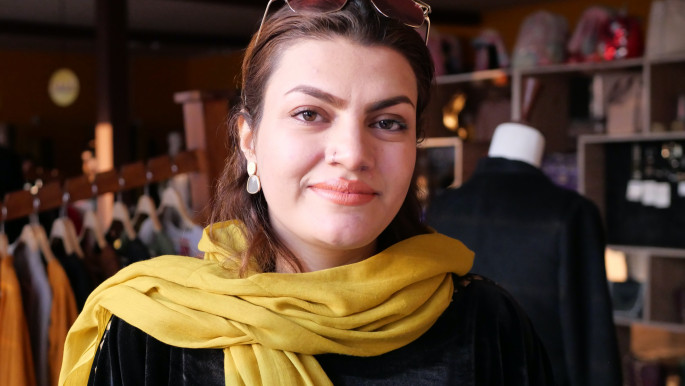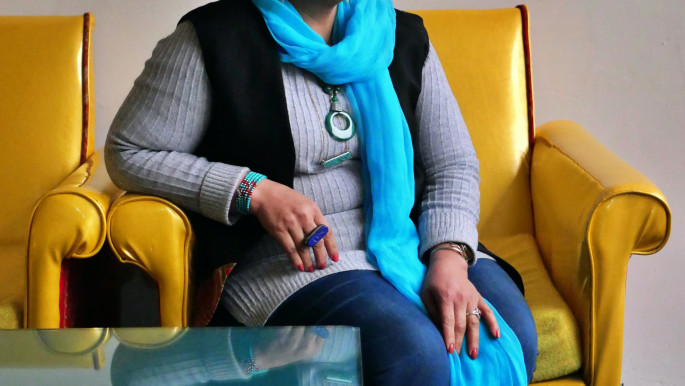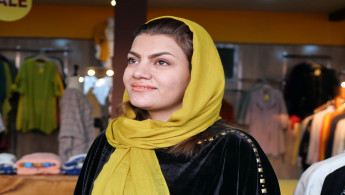A Covid catastrophe: Afghanistan's female entrepreneurs face a huge battle to survive the pandemic
Up against Afghanistan's heavily patriarchal society, Razia Sarwary faced considerable challenges as a woman launching her own business. Now, along with many other female entrepreneurs, she says she is facing a tougher battle than her male counterparts to recover from the impact of the Covid-19 pandemic, and she has far more to lose if her business goes under.
With her father out of work and suffering with a drug addiction, the 24-year-old felt setting up a business was the best way to support her family and she launched her clothing company Zeb Boutique in central Kabul in August 2019.
"My uncle gave the family a loan. I told him I was going to use it to open my own clothing business. He had absolutely no confidence in me but he knew the family was desperate for cash. He just said to me that if I didn't pay back the loan he would kill me. And he meant it," she says laughing.
Razia's entrepreneurial plans were met with a barrage of criticism and doubt, amid concerns over cultural barriers.
"Few people believed in me," she says. "People were shocked that a woman would even rent a shop. I told my now-landlord that I was going to start a business, and I did."
The bright and funky Zeb Boutique store is positioned on a first floor level, offering a relaxed space above a busy street, filled with a range of clothing items to meet various price points. Razia also offers wholesale contracts to other stores.
Now she faces a renewed battle as she tries to keep her company afloat amid the health pandemic.
 |
|
| Razia's entrepreneurial plans were met with a barrage of criticism and doubt |
 |
|
"Prior to the pandemic my monthly business turnover was approximately $15,000. Last month I took just $5,000," she explains.
"My business was closed for four months. I owe around $9,000 in debt. I struggled to find financial support the first time around, people are even less likely to help me now.
"I can't stop my work because, besides the money I've invested, I've also worked hard to overcome plenty of obstacles."
 |
Only around 3% of the 2,400 licensed businesses across Afghanistan's 34 provinces are run by women |  |
Small and medium-sized enterprises account for 85 percent of Afghanistan's total enterprises, they contribute up to half of Afghanistan's GDP and employ more than a third of the country's labour force. Yet, only around three percent of the 2,400 licensed businesses across Afghanistan's 34 provinces are run by women, according to the Afghan Women's Chamber of Commerce and Industry co-founder and president Manizha Wafeq. In total, she says, there are more than 54,000 unlicensed businesses country-wide.
"The major challenge starts with cultural practices – for example, the family and community they're living in being critical or not supportive to women's work outside the home. Those women who are successful in launching their own businesses face a daily struggle and pressure to quit," she says.
Women do not have the same support network – often men inherit family businesses, whereas women have to set up from scratch, says Manizha, meaning they are younger thus weaker enterprises.
Market access and financial support is limited for women in comparison to men, she adds, wholesalers or buyers often do not offer good prices, and women lack business skills because they are not taught from an early age. These factors make women-run businesses more vulnerable and have resulted in a tougher recovery process from the impact of the pandemic.
"We are now really seeing that donor-implemented programmes are not providing the necessary transfer of skills and knowledge. Programmes are too short and not sustainable," says Manizha.
 |
Those women who are successful in launching their own businesses face a daily struggle and pressure to quit |  |
Following the implementation of a lockdown in March, 91 percent of women-run businesses suspended their activities, according to a survey of 110 women carried out in the same month by the AWCCI.
More than 90 percent had no idea how to diversify their business model to adapt to the changing needs of the population; manufacturing PPE or masks, for example, says Manizha.
"We realised the importance of providing continuous exposure to other women so they could gain ideas and understand the options available to them," she says.
The AWCCI is pushing for a raft of support measures to be implemented by the government – from grants and salary subsidies, to rent payment suspensions and licence extensions – but progress is slow.
Just as is the case across the globe, Covid-19 lockdown measures and restrictions in Afghanistan have destroyed livelihoods and exacerbated poverty.
The crisis has "exposed structural and resource gaps in the country's response to unforeseen events", resulting in the reallocation of resources "from long-term development priorities to fighting this health crisis", according to UNDP.
 |
|
| Read also: The female whirling dervishes reclaiming Afghanistan’s Sufi heritage |
Approximately $1.5 billion in aid has been received, yet only about 20 percent of that amount represents new money.
Meanwhile, the country's economy has been pushed into negative growth and a fiscal deficit of more than $800 million was formed in 2020.
The IMF has projected a five percent decline in Afghanistan's GDP, instead of the initial forecast of a 3.3 percent growth.
For women in Afghanistan, having economic independence means enjoying a freedom they would not otherwise have.
Zeb Boutique's owner Razia dresses in a way that is considered different to the usual dress style in Kabul, she is able to spend time with friends and move around the city without a male guardian.
Other women who bring in an income are able to live away from their family. Therefore, a business collapse has wider implications than just a loss of income for businesswomen.
Over on the opposite side of Kabul, Laila Haidari has run her restaurant Taj Begum for a decade. She was one of the first women to do so.
"I built this restaurant 10 years ago to stand on my own two feet. It was a strange concept for people to get their head around – the idea of a woman running a restaurant," says Laila.
The 41-year-old set up the restaurant to finance a rehabilitation centre for drug addicts. Running both the clinic and the business independently was a priority.
 |
|
| Laila Haidari has run her restaurant Taj Begum for a decade |
 |
|
"My friends criticised me and said I was putting myself in danger. They said that men do not respect a working woman.
"I had smear campaigns launched against me – that I was prostituting girls, that there was drinking and drug taking here. People wanted me out, just because I was a woman setting up my own business.
"Business is important for women because economic power gives women more rights and more involvement in politics. Having money means you can play a part in that society," she adds.
Charlie Faulkner is a freelance journalist based in Afghanistan. She has previously lived and reported from Turkey and Jordan. Her work focuses on migration, economics, conflict, human rights, gender issues and culture.
Follow her on Twitter: @Charlie_Faulk



